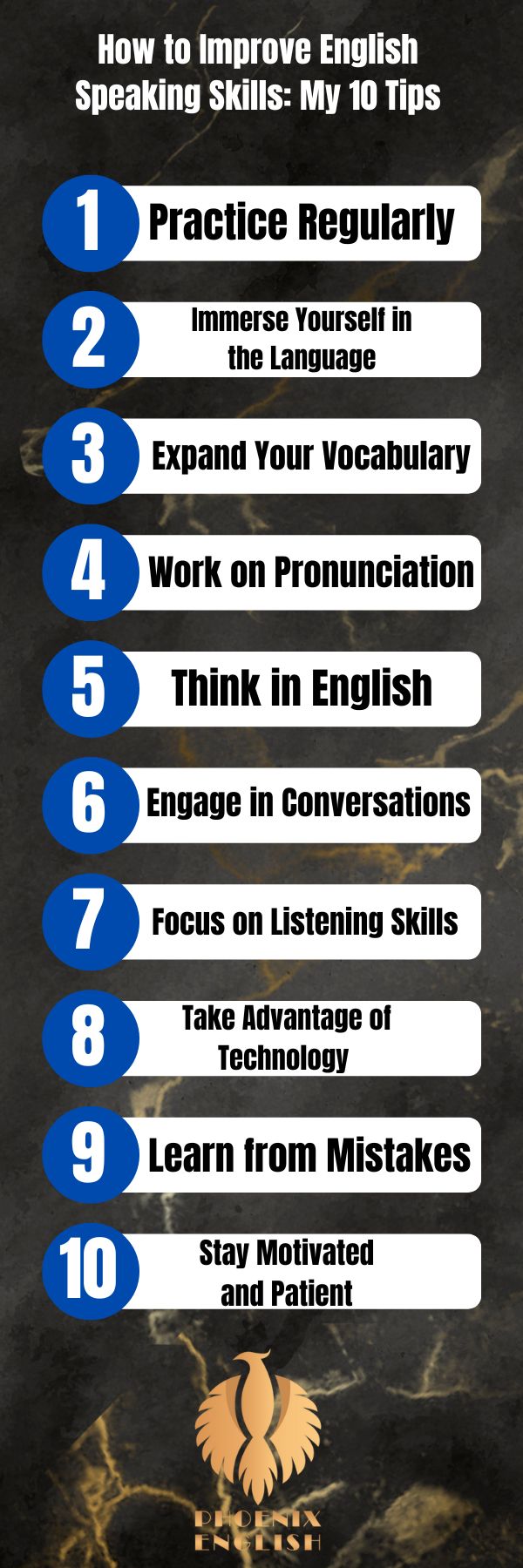To begin with a direct answer to the title, improving your English speaking skills involves practice, exposure, and strategic learning techniques. My personal experience has taught me that consistent effort, along with a few practical tips, can lead to significant improvements in fluency and confidence when speaking English.

Important Points:
- Regular Practice: Speaking regularly is crucial. Engaging in conversations with native speakers or fellow learners exposes you to authentic language use and builds your confidence in expressing yourself.
- Listening Skills: Developing listening skills is closely tied to speaking. By actively listening to native speakers, whether through podcasts, movies, or conversations, you can mimic pronunciation, intonation, and sentence structure.
- Setting Realistic Goals: Establishing specific, achievable goals for your speaking practice can help keep you motivated and focused. Whether it’s learning a set number of new words each week or practicing speaking for a certain duration each day, setting milestones can guide your progress.
- Expanding Vocabulary: A rich vocabulary enhances your speaking abilities. Make it a habit to learn new words and phrases, and practice incorporating them into your conversations to express ideas more clearly and effectively.
- Utilizing Technology: There are numerous applications and online platforms designed to facilitate language learning. Using these tools can provide interactive and engaging ways to practice speaking without the pressures of formal settings.
You might also enjoy:Which of the Following: Definition + Complete Usage + Grammar
As we delve deeper into the topic of improving English speaking skills, I will share my ten actionable tips that can help elevate your conversational abilities and boost your confidence, drawing from my own journey of learning and overcoming obstacles in the process.
—
In today’s globalized world, effective communication in English is more than just a beneficial skill—it’s often a necessity.
Whether connecting with international colleagues in a professional setting, participating in academic discussions, or socializing in diverse environments, the ability to speak English fluently has become a crucial asset.
However, many English learners often find themselves grappling with speaking proficiency, feeling hesitant or even anxious about engaging in conversations.
My journey toward improving my English speaking skills has been filled with challenges, revelations, and rewarding experiences that have shaped my approach to language learning.
When I first began learning English, I found that my enthusiasm was often overshadowed by self-doubt. The fear of making mistakes paralyzed me, leading to missed opportunities to practice and grow.
The complexities of pronunciation, grammar, and vocabulary seemed daunting, making it difficult to express my thoughts clearly.
Yet, through persistence and experimentation with various techniques, I discovered that the path to fluency is not only achievable but can also be enjoyable.
Ultimately, I realized that improving English speaking skills revolves around three fundamental concepts: consistent practice, active engagement, and experiential learning.
The process requires establishing a routine that prioritizes regular speaking opportunities, whether through formal classes or informal conversations with friends.
Each encounter is a stepping stone, leading to greater confidence and fluency.
Additionally, immersing oneself in the language through music, films, and literature helps to refine listening skills, provides exposure to different accents, and stimulates vocabulary acquisition.
From my experiences, I learned that setting achievable goals played a crucial role in maintaining motivation.
Breaking down the journey into smaller milestones—such as increasing conversation time or mastering specific topics—made the process less overwhelming.
Furthermore, learning to embrace mistakes as part of the journey rather than viewing them as setbacks was transformative. Each error became a valuable lesson, paving the way for improvement.
In this guide, I will share ten practical tips to enhance your English speaking skills, derived from my own journey and insights gained along the way.
These tips range from establishing a supportive learning environment, seeking opportunities for real-time communication, and utilizing technology to connect with native speakers.
Emphasizing the importance of every learner’s unique path, my goal is to provide actionable strategies that resonate with various learning styles, enabling you to find your own voice in English.
The adventure of improving English speaking skills is not merely about attaining proficiency; it is about connecting with others and broadening one’s horizons.
Join me as we explore these ten tips, inviting you to engage with English in a way that inspires confidence and cultivates a deep appreciation for the language, ultimately enriching your personal and professional interactions along the way.
Through this journey, you will discover that the keys to success lie not only in determination but also in finding joy in the learning process itself.
Let’s embark on this transformative path together and unlock the potential of your English speaking skills!
How to improve English speaking skills? First, practice regularly, immerse yourself in the language, and expand your vocabulary.
Second, focus on pronunciation, think in English, and engage in conversations to build fluency.
Finally, Strengthen your listening skills, use technology for interactive learning, and embrace mistakes as learning opportunities.
You Might Also Enjoy:Reinforce Vs Reenforce: 10 Differences + Examples [2025]

1. Practice Regularly
The most crucial thing I did was to consistently practice speaking English. The secret to learning a new language is consistency. I deliberately tried to include English into my everyday activities.
Frequent practice strengthened my abilities, whether I was conversing with friends, taking part in language exchange events, or even just chatting to myself.
In order to make sure I stuck to my aim, I also set aside particular periods of the day for concentrated practice.
Consistency in practice not only builds confidence but also helps in retaining what has been learned. Initially, I found it helpful to schedule short, manageable practice sessions throughout the day. Gradually, I increased the duration as my comfort level improved.
Joining a language club or finding a speaking partner was also beneficial, as it provided a structured environment to practice and receive
feedback. Through regular practice, I began to notice improvements in my fluency and ability to think in English.
You might also enjoy:Where Does “How is your Day Going?” Originate From?
2. Immerse Yourself in the Language

For me, immersion was a key component of learning. I tried to surround myself with as much English as I could.
This included reading books and articles written in English, viewing English-language films and television shows, and listening to English-language podcasts and music. I was able to learn about various accents, slang terms, and cultural quirks thanks to immersion.
I became more fluent in the language and gained an instinctive grasp of how English is employed in different situations by continuously exposing myself to it.
I followed English-speaking social media profiles and switched the language settings on my gadgets to English in order to create an immersive experience.
I had to rely more on my listening abilities when I watched something without subtitles, but they got better with time. Using English-language media
made studying enjoyable and gave context. Engaging with English media not only made learning fun but also provided context for vocabulary and phrases.
I also attended local events where English was spoken, such as lectures, theater performances, and community gatherings, to further immerse myself in the language.
You might also enjoy:Interested In or On: The Differences + Examples [2025]
3. Expand Your Vocabulary
Having a large vocabulary is necessary for communicating effectively. I developed the practice of constantly picking up new words and expressions.
I used to write down any fascinating terms I came across in a notebook. Making use of vocabulary applications and flashcards was also incredibly beneficial.
More significantly, I made an effort to support my learning by using new words in my work and conversations.
Increasing the number of words in my vocabulary helped me talk more fluently and feel more comfortable expressing myself.
Apart from the conventional techniques, I discovered that learning terms in categories like cuisine, travel, or business helped me recall and apply them in the right situations.
Engaging in word games and challenges with friends also added a competitive edge to vocabulary building.
Another effective strategy was learning word roots, prefixes, and suffixes, which helped me decipher the meanings of unfamiliar words.
By actively expanding my vocabulary, I became more articulate and expressive in my conversations.
You might also enjoy:What Kind of Vs What Kinds of – Differences + Examples [2025]
4. Work on Pronunciation

When learning a new language, pronunciation can be a significant challenge. To improve my pronunciation, I paid close attention to how native speakers articulated words. I practiced mimicking their intonation and rhythm.
Online resources like YouTube videos and pronunciation apps were invaluable in this regard.
I also found areas where I needed to improve by recording my speech and comparing it to native speakers.
I was able to talk more clearly and be understood by others by concentrating on my pronunciation.
Additionally, I studied the International Phonetic Alphabet (IPA), which helped me visualize sounds and comprehend how to pronounce them correctly.
Working with a speech coach or enrolling in a pronunciation course can offer tailored advice and criticism.
My pronunciation and speech rhythm were enhanced by practicing tongue twisters and participating in shadowing activities, where I had to repeat audio recordings verbatim. My confidence in speaking English increased along with my pronunciation.
5. Think in English
One of the game-changers for me was learning to think in English. Initially, I used to translate my thoughts from my native language to English, which slowed me down and made me speechless.
By training myself to think directly in English, I started to speak more naturally and spontaneously.
You might also enjoy:Too Cute Meaning Vs To Cute (To Vs Too) + Examples
Although it took some time, this mental adjustment really improved my fluency.
I began by mentally narrating my everyday actions in English in order to form this habit.
I was able to practice thinking in English by doing simple things like making grocery lists, organizing my day, and thinking back on my experiences.
Keeping a regular English-language journal served to reinforce this behavior. Speaking and expressing my ideas to myself in English strengthened my ability to think in the language. With practice, this activity reduced my reliance on translation and increased my ability to speak more fluently.
6. Engage in Conversations
Engaging in conversations with native speakers and fellow learners was immensely beneficial. Real-life interactions forced me to think on my feet and adapt to different speaking styles.
Whether it was through social gatherings, language exchange programs, or online resources like chat rooms and forums, I actively looked for chances to speak with people.
Through these conversations, I was able to gain confidence and get over my anxiety of making mistakes in addition to honing my speaking abilities.
Joining a conversation club or finding a language exchange partner offered a helpful setting for practice. Participating in group discussions and debates has increased my capacity to articulate myself persuasively and clearly.
I also worked on asking open-ended questions and listening to the responses I got to make discussions more engaging and fascinating.
These conversations helped me practice navigating a variety of conversational situations and improved my ability to express myself clearly.
7. Focus on Listening Skills

Listening is an integral part of effective communication. To improve my speaking skills, I worked on my listening skills as well. I listened to a variety of English content, including news broadcasts, podcasts, and audiobooks.
This exposure helped me understand different accents and speaking speeds.
Exercises that involved active listening, such as summarizing or repeating back what I heard, improved my understanding and my capacity to react appropriately in conversations.
My hearing abilities were improved by doing things like taking listening comprehension tests, practicing dictation, and viewing movies with subtitles.
In order to better understand and pick up on subtleties, also discovered that slowing down the audio content’s playback speed was beneficial.
I became more accustomed to a wide range of speaking styles and increased my vocabulary by listening to a variety of genres and topics.
My capacity to participate in insightful and insightful talks increased along with my
listening abilities.
You might also enjoy:How Are You Fairing or Faring? Differences + Examples
8. Take Advantage of Technology
Technology offers numerous tools to aid language learning. I made extensive use of language learning apps, online courses, and speech recognition software. Apps like Duolingo, Babbel, and Rosetta Stone provided structured lessons and interactive exercises.
Speech recognition tools like Google Assistant and
Siri allowed me to practice speaking and receive immediate feedback.
Utilizing these technological resources made my learning process more engaging and efficient. I also looked at online forums and groups for language learning, where I could exchange experiences, ask questions, and get help from other students.
By taking part in online language exchange programs, I was able to communicate with native speakers all around the world. My learning experience was further customized by employing language learning software that adjusted to my ability level and learning speed.
In addition to offering helpful tools, technology helped me stay accountable and motivated while I learned a language.
9. Learn from Mistakes
Making errors is a necessary component of learning a new language. Instead of being discouraged by errors, I viewed them as learning opportunities. I paid attention to the corrections and feedback I received from others.
By dissecting my errors, I was able to identify my areas of weakness and concentrate on strengthening them.
I eventually learnt to accept mistakes as a normal part of the
learning process and to grow more at ease with making them. Keeping a language journal in which, I noted my errors and the solutions gave me important insights into how far I had come in my language acquisition.
You Might Also Enjoy: Top 60 Most Common Simple Sentences In English
I was able to spot patterns and areas that required additional work by thinking back on my mistakes. Seeking help and accelerating my growth was made possible by asking teachers, native speakers, and language partners for constructive criticism.
Accepting mistakes as a necessary part of the learning process enabled me to attempt new things and take chances, which eventually improved my English-speaking ability and confidence.
10. Stay Motivated and Patient
Language learning is a marathon, not a sprint. Staying motivated and patient was crucial to my progress. I made reasonable goals and acknowledged little accomplishments along the way. Surrounding myself with supportive people who encouraged me made a big difference.
I also reminded myself of the reasons why I wanted to improve my English-speaking skills, which kept me driven even during challenging times. Overcoming challenges and becoming fluent required persistence and a positive outlook.
Putting my language learning objectives on a vision board and keeping a visual record of my progress helped me stay motivated. Establishing both short- and long-term objectives, like finishing a book or striking up a conversation without fear, gave focus and a feeling of achievement.
I stayed motivated by reading about other language learners successes and acknowledging and appreciating my own accomplishments, no matter how minor. I was able to remain devoted and resilient by acknowledging that learning a language is a gradual process and by exercising self-compassion when I faced obstacles.
Additional Tips and Reflections
Although these ten suggestions served as the cornerstone of my language learning process, I also gained other knowledge and insights that enhanced my learning process. Here are some more reflections that you might find useful:
You might also enjoy:Emersion Vs Immersion: Meaning, Differences, and Examples
Use Real-Life Contexts

Learning became more relevant and useful when linguistic abilities were put to use in authentic situations. I made an effort to speak English whenever I could, whether it was at work, on the road, or in social situations.
Taking part in community events, volunteering, and joining groups were examples of activities that needed English and offered real-world practice. These real-world situations enabled me to put what I had learnt into practice and adjust to various communication situations.
Join Study Groups
Getting involved in study groups or starting language learning circles fostered accountability and a sense of community. By working together with people who had similar objectives, we were able to encourage and support one another.
We exchanged materials, worked on our speaking skills, and gave each other
helpful criticism. Study groups provided a forum for talking about difficulties, sharing advice, and commemorating accomplishments with one another.
You might also enjoy:Looking Forward To Seeing You: Grammar + Examples[2025]
Explore Cultural Aspects
Comprehending the cultural nuances of the language enhanced my educational journey. Through reading, watching movies, and conversing with native speakers, I learned about the cultures of English-speaking people.
My linguistic abilities gained perspective and richness by learning about social traditions, colloquial idioms, and cultural standards. My capacity to interact politely and successfully in a variety of contexts has improved as a result of this cultural understanding.
Set Achievable Milestones
Establishing attainable goals helped me stay motivated and focused. My language learning experience became less overwhelming when I divided it up into smaller, more achievable goals.
Every accomplishment, like finishing a language course, picking up a new vocabulary, or having a successful conversation with a native speaker, gave me confidence and a sense of accomplishment.
Engage in Creative Activities
Engaging in creative activities like writing, storytelling, and role-playing made learning enjoyable and interactive. I wrote essays, short stories, and journal entries in English to practice my writing skills.
Role-playing scenarios, such as job interviews or travel situations, allowed me to practice speaking in different contexts. These creative activities added variety to my learning routine and kept me engaged.
Seek Professional Guidance
Getting expert advice from tutors or language teachers offered individualized feedback and organized learning. Taking language classes or working with a tutor provided a methodical way to learn a language.
Teachers helped me overcome difficult grammatical and pronunciation problems, corrected my errors, and offered insightful commentary. My study was hastened by professional coaching, which also gave me a solid foundation in English.
Reflect on Progress
Regularly reflecting on my progress helped me stay on track and make necessary adjustments. I reviewed my learning strategies, identified areas of improvement, and celebrated my achievements.
Reflecting on my journey allowed me to appreciate how far I had come and motivated me to keep moving forward. Keeping a language journal where I documented my experiences, challenges, and successes provided a tangible record of my growth.
Stay Curious and Open-Minded
The learning experience was more pleasurable and enlightening when one maintained an attitude of curiosity and openness. I had a curious attitude about learning a language and was excited to discover new terms, idioms, and cultural quirks.
Keeping an open mind to various teaching approaches and modifying my tactics according to what I found most helpful kept the process fluid and productive. Adopting a growth mindset enabled me to see obstacles as chances for development and advancement.
Conclusion
To sum up, honing your English-speaking abilities need commitment, repetition, and the appropriate techniques. I was able to make great progress in my language learning journey by practicing frequently, immersing myself in the language, increasing my vocabulary, honing my pronunciation, thinking in English, participating in conversations, concentrating on listening skills, utilizing technology, learning from mistakes, and remaining patient and motivated.
These pointers not only improved my English communication skills but also made studying a new language more enjoyable overall. Learning a language is an ongoing process, and with each step I take, I get closer to becoming fluent and more confident in my English speaking.

Hi, welcome to my blog! My name is Omid and I am thrilled to have you here! I am an English language teacher with 12 years of experience and hold multiple international certifications (TESOL, IELTS, TOEFL, PTE, CELTA). Additionally, I hold a PhD in Applied Linguistics with a specialization in Teaching English as a Second Language (TESL), which fuels my passion for teaching English and assisting others in mastering the language. To me, nothing is more rewarding than helping individuals enhance their English language abilities through various methods. So, let’s embark on this journey of learning English together.




